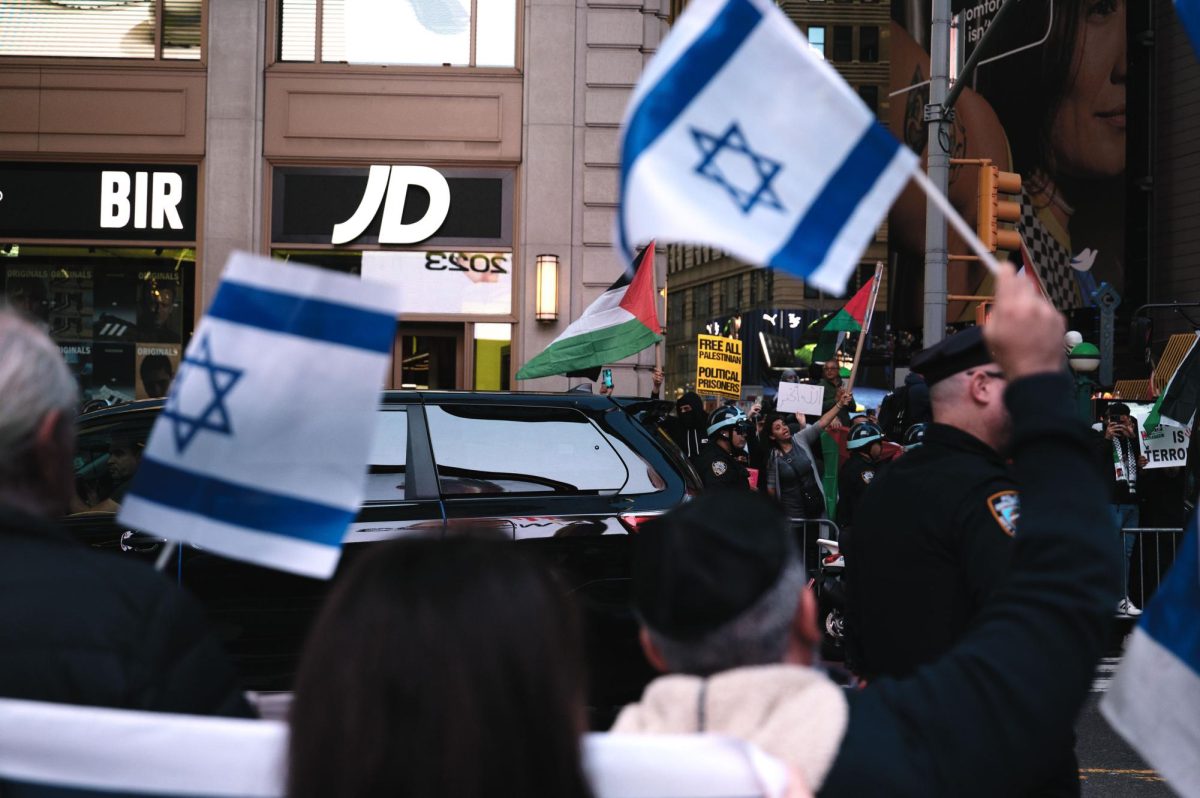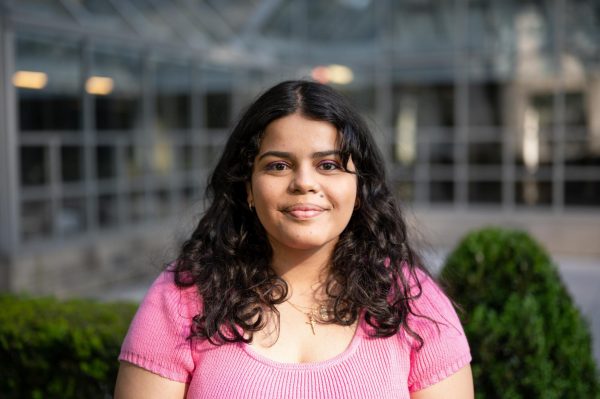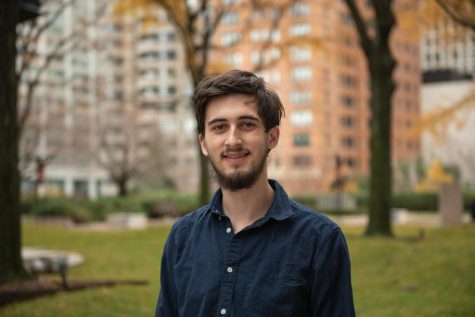Note: The information included in this article was accurate at the time of publication.
The attack on Israel by Hamas — the militant and political organization that has governed Gaza since 2006 — on Oct. 7 and Israel’s retaliatory airstrikes that followed have sparked responses from Fordham club leaders, organizations and members of the administration.
The escalating violence has exacted a heavy toll among civilians. The New York Times reported that Hamas’ attack in southern Israel killed at least 1,400 Israelis along with 29 Americans and victims from over a dozen countries. Following the assault, an estimated 200 hostages were taken back to Gaza.
Since then, Israel has launched retaliatory airstrikes. According to the Palestinian Health Ministry, nearly 2,800 Palestinians have been killed as of Oct. 17. This number does not account for the casualties from an explosion at Al Ahli Arab Hospital in Gaza City on Tuesday night, which has so far killed at least 500 people according to the ministry.
According to the New York Times, thousands of soldiers and materials have been massed at the Israel-Gaza border for a possible incursion in the 25-mile long strip of land that is home to a population of over 2.2 million people.
The hospital blast in central Gaza City claimed the lives of civilians and medical staff who were working to provide aid and shelter to those injured or displaced from the retaliatory air strikes. The source of the blast has yet to be determined, as the Israel Defense Forces (IDF) said the explosion was caused by a Palestinian armed group while Gazan health authorities note that the blast was the result of an Israeli airstrike.
The Israeli-Palestinian conflict has lasted decades and has long been a contentious and tense dispute involving religious, ethnic and political disagreement over the establishment of the Israeli state, which was chartered by the United Kingdom who had been occupying that land upon the collapse of the Ottoman Empire. Prior to the creation of the Israeli state, Palestinians resided in the region. For more than seven decades, Israelis and Palestinians have engaged in violent conflict regarding regional land claims.
Along with the retaliatory airstrikes directed at the Gaza Strip, Israel has mobilized 360,000 military reservists. According to the New York Times, thousands of soldiers and materials have been massed at the Israel-Gaza border for a possible incursion in the 25-mile long strip of land that is home to a population of over 2.2 million people.
In addition to the bombing and airstrike campaign that has ensued since Hamas’ attack on Oct. 7, the Israeli government informed the United Nations on Oct. 12 that the over 1 million Palestinian civilians in northern Gaza should relocate to the southern part of the region, a migration which the United Nations described as “impossible … without devastating humanitarian consequences.” Palestinians have faced limited access to water, fuel and sources of electricity.
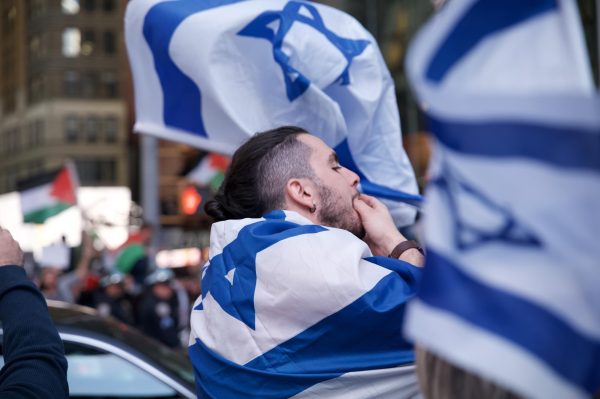
According to The New York Times, Israel has launched airstrikes and missiles into southern Gaza, where Palestinians were told to evacuate, many in hopes of crossing the border into Egypt through the Rafah crossing — the only land route to escape the war.
In an email sent to the Fordham community on Oct. 10, with the subject line “Prayers for Consolation and Peace,” President Tania Tetlow decried the attack led by Hamas and mass casualties inflicted on civilians.
“Many members of our community are in unimaginable pain, terrified for loved ones in both Israel and Gaza, or mourning friends and family already lost to the horrific attacks and now to the war,” the president said in the email.
Tetlow added that for the university’s Jewish students, colleagues and alumni, this attack is another reminder of the rising antisemitism in the U.S. and across the world. She noted that Muslim students, colleagues and alumni face the fear of collective blame and reprisals alongside worries of violence and discrimination.
Interfaith prayer services led by Campus Ministry were announced in the president’s communication on Oct. 10 as Tetlow noted hopes of being able to “come together to pray hard for peace.” These services reached out to different religious communities on campus to read an excerpt from their religion’s text, with invitations extended to the Jewish Students Association (JSO), the Muslim Student Association (MSA) at Lincoln Center and other faith-based clubs.
“Many members of our community are in unimaginable pain, terrified for loved ones in both Israel and Gaza, or mourning friends and family already lost to the horrific attacks and now to the war,” President Tania Tetlow
Following Tetlow’s email, clubs and organizations across the university’s Rose Hill and Lincoln Center campuses took to their social media accounts to upload statements regarding the war. The Muslim Students Association (MSA) at Rose Hill, and another organization, Students for Justice in Palestine (SJP), shared separate statements condemning Israel’s actions as well as expressing a need for president Tetlow to acknowledge Palestinians in her university-wide communication.
MSA at Rose Hill noted that their statement is an acknowledgement of “President Tetlow’s recent email completely disregarding Palestine” and added that Palestinians have the right to “defend their homeland and find a means to liberation.”
“Inshallah, there will be light at the end of the tunnel,” MSA at Rose Hill’s statement read. “Palestine will be restored, whether in this life or the hereafter.”
SJP’s joint statement with Fordham PSN shared that SJP “irrevocably and unconditionally stands with Palestinians worldwide,” and condemns Zionism as well as the U.S. government’s reaction to Palestinian resistance and vowed support for the Israeli government.
“We Palestinians and those who care for the Palestinian movement as their own express the utmost disgust at the spread of misinformation and the lack of humanity attributed to Gazans and all Arabs and Palestinians who stand in solidarity with resistance,” part of the joint statement read.
In regard to the university’s response, both organizations said neither Palestine nor Palestinians are mentioned once in president Tetlow’s university-wide communication from Oct. 10.
The administration and president Tetlow could not be reached for comment in response to these statements.
A spokesperson from SJP, Fordham College at Lincoln Center ’24 who chose to remain anonymous due to fears of retaliation from Canary Mission, a website which claims to “(document) people and groups that promote hatred of the USA, Israel, and Jews on North American college campuses,” said SJP waited to publish a statement because they wanted to see the administration’s response.
They shared that SJP plans to invite Tetlow to an information session on Oct. 26 from 11 a.m. to 2 p.m. but have yet to determine a place on the Lincoln Center campus as SJP is not officially recognized as a club and is unable to reserve spaces. They also added that SJP plans to write an open letter to Tetlow inviting her to the information session, where SJP plans to discuss “different avenues for change.”
The spokesperson for SJP noted that the organization reached out to several organizations on campus in an effort to spread their statement — which was successful for the most part.
A representative of the United Student Government at Lincoln Center (USGLC) shared that the organization reposted the joint statement between SJP and Fordham PSN on its platform. They added that “no student gave consent in being interviewed due to safety concerns among others.”
According to the SJP spokesperson, they received pushback from the Alexander Hamilton Society (AHS), an organization at Fordham dedicated to politics, foreign policy and international relations. AHS published a statement on Oct. 16 addressing a request to “show anger against the United States” as well as condemn president Tetlow’s university-wide communication. The chapter expressed that they will not produce an anti-American agenda and are in support of the president’s non-partisan call for interfaith solidarity.
The spokesperson for SJP noted that the organization reached out to several organizations on campus in an effort to spread their statement — which was successful for the most part.
Additionally, AHS acknowledged that they will never support those justifying the actions of Hamas and other militant organizations and will not lend public support to Israel’s blockade on movement out of Gaza and the shutdown on water, fuel and energy resources.
“If this statement is enough to convince you into believing we are taking a side – Yes. We are totally, completely, and absolutely opposing terrorism,” the statement read.
Aditya Goswamy, FCLC ’26 and president of AHS, declined to share the origin of the requests made to AHS in response to the club being asked to “show anger against the United States.” He added that AHS is against anti-American sentiment and “will not partake in any condoning or justification of this.”
“We were also asked to condemn President Tetlow’s statement which followed a massacre of 260 people at a rave-concert,” Goswamy said. He added that AHS refuses to do so and stands in support of the president’s requests for interfaith prayer, urging the entire Fordham community to “move towards a stronger bond between different religions represented by students on campus.”
The anonymous spokesperson for SJP shared that AHS’ statement was in direct response to SJP’s outreach to publish SJP’s joint statement with the Palestine Solidarity Network at Fordham.
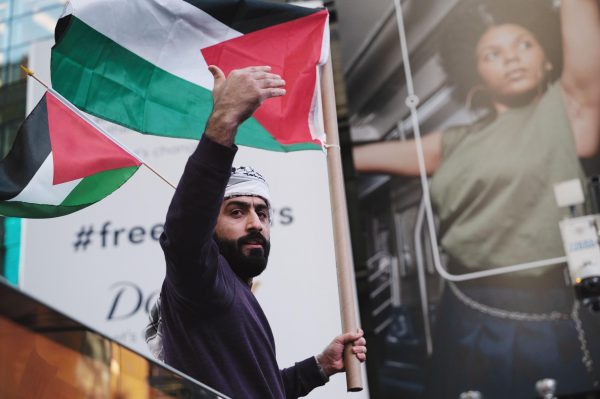
Reyna Stovall, Fordham College at Lincoln Center (FCLC) ’25 and vice president of the Jewish Students Organization (JSO), shared that she has been unable to develop a fully formed opinion on the events that have unfolded since the Oct. 7 attacks because the conflict is a nuanced issue with a complex history.
“I think a lot of what’s happening, especially to civilians, it’s horrible,” she shared. “But beyond that, politically, I don’t quite know where I stand.”
In response to Tetlow’s statement, Stovall said that from a personal standpoint, it was comforting to know that the president was thinking about impacted families. As for any avenues of support the university could offer, she mentioned the Jewish community’s concern about rising levels of antisemitism, and that any specific actions from the university to combat it would be comforting.
Stovall added that she has not personally felt unsafe or uncomfortable on campus as a Jewish student. In terms of any resolutions to the ongoing violence, Stovall noted that she cannot think of an equitable solution herself.
“I haven’t come to anything in my mind that quite makes sense,” she said. “And that’s equitable or equal to all people involved.”
Stovall noted that she spoke from her own perspective and not as a representative of the JSO at Lincoln Center. The JSO at Lincoln Center has not released a statement on the war as of Oct. 17 and could not be reached for comment prior to publication.
The war has also resulted in impassioned responses from students, administrators and some alumni from other universities across the U.S., including Columbia, Harvard and UPenn, in protest of the violence.
Demonstrations across New York City, including a large gathering in Times Square, have taken place on Friday following a former leader of Hamas’ call for a “day of rage,” according to reports from the Washington Post and The New York Times. These calls prompted Associate Vice President of Public Safety Robert Fitzer’s university-wide communication on Oct. 12 notifying students of potential protests that may occur in New York City the following day as well as NYPD patrols that may be present across the campuses.
“There are no credible threats at this time, according to the NYPD, but police are taking the situation very seriously,” Fitzer said. “The NYPD is on heightened alert, with increased patrols at synagogues, mosques, and colleges and universities, as well as other high profile locations throughout the city.”
As of Oct. 17, Biden and world leaders from countries across the Middle East issued their expressions of outrage and horror following the explosion at Al Ahli Arab Hospital in Gaza City.
Additionally, Israel’s Prime Minister Benjamin Netanyahu has faced calls from Ione Belarra, Spain’s minister of social rights, to be brought before the International Criminal Court and be investigated for war crimes.

